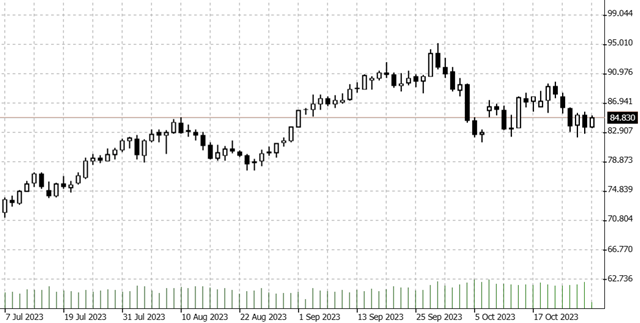

27.10.2023 – The oil market is on the lookout: WTI and Brent have recently become cheaper again. Both grades are the seismographs for the Middle East conflict – and here, despite the ongoing fighting, the situation is comparatively calm, measured against what is possible in a worst-case scenario. However, traders and investors should remain vigilant. Especially since the fundamentals also speak for rising prices.
WTI has returned to the level of before the attack on Israel on 07/10, here the daily chart. According to analysts at Standard Chartered, it is quite possible that the dominance of headlines from the Middle East has distracted many traders from the ongoing shortage in the oil market.

Source: Bernstein Bank GmbH
Indeed, the Middle East conflict has remained largely confined to Gaza of late: Israel has postponed its ground offensive after U.S. intervention. Hamas cowardly continues to entrench itself among civilians to produce as many images of dead children as possible for the world’s media. Iranian-directed militias in Syria attacked American troops, who fought back with curbed foam as a small token to Tehran. There were minor skirmishes on the northern border with Lebanon.
Much speaks for the bulls
Standard Chartered analysts added that the market is significantly underestimating the risk in the Middle East – and that the supply/demand balance alone justifies higher prices. In fact, global supply continues to fall. According to the latest data from the Energy Information Administration (EIA), crude oil inventories slipped 4.49 million barrels to 419.75 million. In Cushing – Oklahoma’s Kaffir is one of the key price drivers for WTI – inventories fell 0.76 million to a nine-year low of 21.01 million barrels.
The bank’s London-based experts predict a global shortage of 120 million barrels in the fourth quarter. The demand side is actually in favor of the bulls as well: According to StanChart, global oil demand has already exceeded the pre-Covid level from August 2019.
With that in mind, if you have exposure to the oil market, be prepared for anything. An escalation in the Middle East can drive prices up quickly. Just now, Israeli Defense Minister Yoav Gallant reiterated that the big ground offensive was coming – and that Israel would win because the next 75 years depended on it.
Oilprice.com judged that the price of oil could hit triple digits if it does. We think: If the situation cools, oil prices will dive as speculators unwind long positions. Whether long or short – Bernstein Bank wishes successful trades and investments!
________________________________________________________________________________________________________________________________________________
The content of this publication is for general information purposes only. In this context, it is neither an individual investment recommendation or advice nor an offer to purchase or sell securities or other financial products. The content in question and all the information contained therein do not in any way replace individual investor- or investment-oriented advice. No reliable forecast or indication for the future is possible with respect to any presentation or information on the present or past performance of the relevant underlying assets. All information and data presented in this publication are based on reliable sources. However, Bernstein Bank does not guarantee that the information and data contained in this publication is up-to-date, correct and complete. Securities traded on the financial markets are subject to price fluctuations. A contract for difference (CFD) is also a financial instrument with leverage effect. Against this backdrop, CFD trading involves a high risk up to the point of total loss and may not be suitable for all investors. Therefore, make sure that you have fully understood all the correlating risks. If necessary, ask for independent advice. CFDs are complex instruments and are associated with the high risk of losing money quickly because of the leverage effect. 68% of retail investor accounts lose money trading CFD with this provider. You should consider whether you understand how CFD work and whether you can afford to take the high risk of losing your money.7
